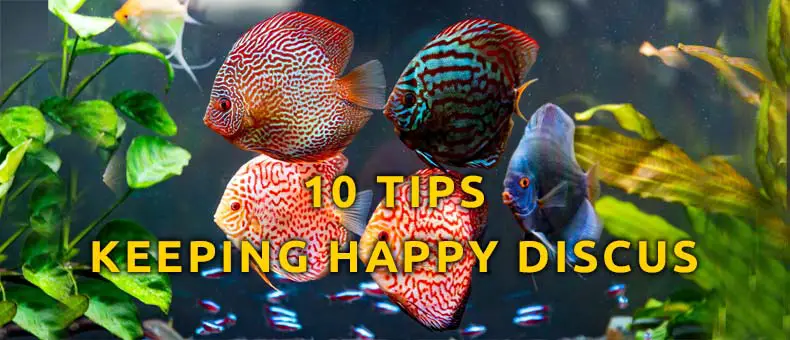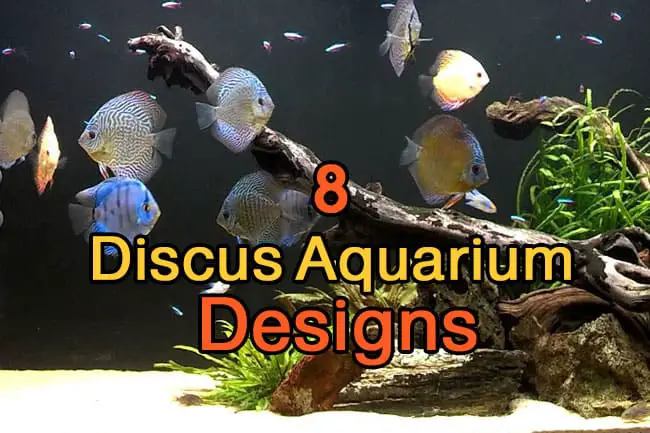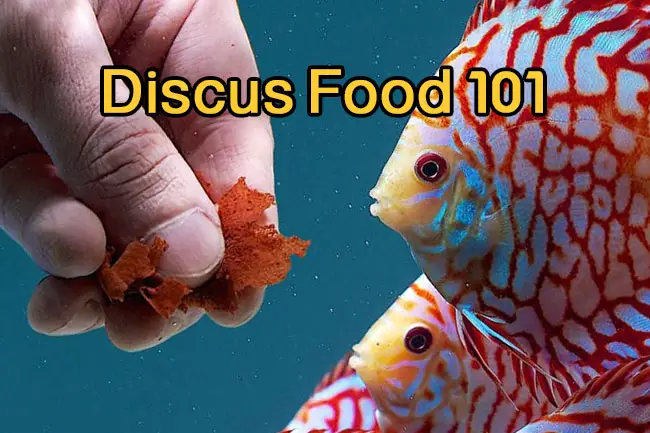
The most basic Discus care tip is to keep your aquarium clean and feed them properly. These fish are extremely sensitive to diseases and water conditions.
Although this species of fish is so beautiful, it is not as common in the aquarium trade as other fish. This is since the discus is one of the most difficult freshwater fish to keep.
Table of Contents
How To Keep Discus Fish Happy?
Discus is one of the most beautiful tropical fish but keeping them can be a challenge. The environment is extremely important to these reactive fish. There are some important tips you can follow to keep discus happy and healthy:
#1 – Water Quality
The first tip for caring for discus is to keep a good water quality. These fish are extremely sensitive to diseases and water conditions.
Because Discus do not tolerate changes in water quality well, and a smaller tank is more likely to lead to pH fluctuations, a 50-gallon tank is likely to be the smallest tank for them.
#2 – Safety Measures
Remember to quarantine new fish before adding them to your tank. New fish can introduce bacteria, parasites, or diseases into the aquarium.
#3 – Water Temperature
Adjust the water temperature. Discus are tropical fish, they thrive in water temperatures between 84 – 86 degrees Fahrenheit. Using a heater in your aquarium will keep the water temperature in the ideal range for your fish.
- For conventional Discus storage: 84F-86F
- For raising young or growing Discus babies: 86F-88F
- Elevated temperature speeds up metabolism, which allows more feedings and faster growth.
- For Discus breeding or keeping in an aquarium with plants: 82F.
- The cooler temperature mimics the natural environment of the Amazon rainy season and encourages them to breed.
#4 – Playing and Hiding
Understand the type of environment Discus love. The body of the discus is ideally suited for swimming in the foliage.
In the wild, Discus often hides under tree trunks, rocks, plants, or other protected areas. Make sure your tank has enough hiding places for discus.
#5 – Feed
Another tip for caring for discus is to feed them properly. Discus love lives food such as maggots, mosquito larvae, water fleas, or brine shrimp.
Discus has tiny mouths for such a large fish, and this gives us an idea of how and what they eat.
They need to eat little and often, as well as high-protein foods to maintain weight and have a fast metabolism.
Mosquito larvae are taken despite being low in nutrients, and it is much better to put them in special discus food.
#6 – Environment
During the process of feeding Discus, it is a very reactive fish, they react to your presence in the room, to things on TV, and even to touching the glass if you come up before eating.
Regularly pay attention to your feeding habits. If they do not eat, something is wrong.
#7 – Filtration
Another obvious Discus care tip is to equip your aquarium with a good filter. Just because it is obvious does not mean it should be ignored.
The top filter is easy to clean and is well suited for the general aquarium.
#8 – Place of Tank
Put your tank in a good place, Discus should be in a quiet place without much activity. Even shadows or vibrations caused by people walking past the aquarium or opening or closing doors nearby can make the fish nervous.
#9 – Lighting
Overhead lighting is tip number nine. Placing lights at the top reduces shadows that can scare away fish. Discus feel safer when you see them, but they do not see you.
#10 – Water Changing
When caring for discus, remember to schedule weekly water changes. They require a change of at least twenty to thirty percent of the water in the aquarium, but you should not change a large amount of water in the aquarium at once, as this will stress your Discus fishes.
As mentioned above, water quality is especially important for Discus. If too much water is replaced at once, the quality will fluctuate greatly.
Conclusion
By taking the time to learn the specific requirements of Discus and the simple tips you can use to keep them happy and healthy, you should have a minimum number of problems overall.
I encourage you to be patient and diligent. Now you are not looking after a simple goldfish that can be kept with minimal effort, but a unique, colorful, and often sensitive discus. Discuses are often not killed by water changes or skipped meals; This is an accumulation of poor aquarium maintenance due to frequent water changes and missed feedings.
Discus care requires a lot of research and careful customization, and DiscusRescue.com is one of the best resources that you need to use to make sure you do not skimp on quality equipment, water changes, and tank size right from the start. If you are ready to combine this with the right aquarium maintenance, you are ready to start your first discus tank!





Re: Swim bladder disorder.
This procedure is not for everyone and definitely not for the squeamish.
My 7.5″ 3 year old Pigeon Blood has had marble sized lump in the swim bladder towards the tail for 3 weeks now (not eating either) and nothing has helped including epsom salts, heat and meds. I finally realized I had to manually vent the bladder if I was to save him.
Last night, I sterilized a standard 1cc syringe with rubbing alcohol, removed the plunger and barely inserted it up under the scales and into the lump in a sideways motion just top right of lateral side fin and just below the lateral line. I then gently pushed on the raised area until it was no longer protruding. I then replaced him into my 65 gallon bare bottom tank with his 4 other discus mates.
Immediately he was swimming correctly and obviously very relieved. He’s fine this morning and eating as if nothing ever happened.
I will update this post if things go south from here.
This was done as a last ditch effort after nothing else worked.
Please do not attempt this procedure without trying epsom, heat and meds first and doing the proper research beforehand as well as doing it with as little time out of water as safely possible.
I bought a rafflesia discus online. I have four others that feed from my hands. I have teras in with them. The new discus is very malnourished and is not eating or moving much. I am trying to not stress it. Had it two weeks. Want it to feed very scared of me. How do I get it to trust me.